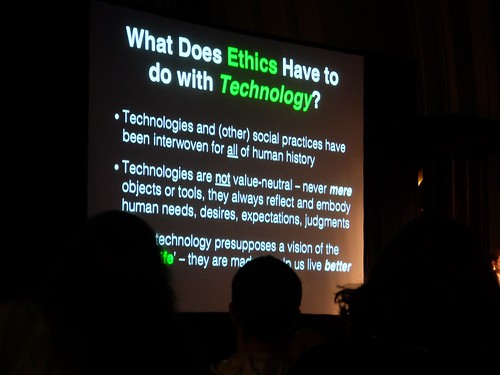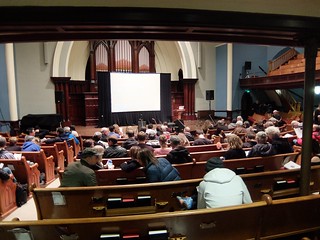How is techno-morality different from morality more generally? The virtues Dr. Vallor ticked off sounded familiar: courage, humility, wisdom, magnanimity... I'd add fortitude, the ability to persevere in the face of adversity.
For example, when I tried to upgrade my copy of PyDev recently, the Python developers' plug-in for Eclipse, the screen dump showing error messages might have demoralized a lesser version of me. But with the right mental attitude, I was able to focus on the documentation and "just do it" as they say around NikeTown.
Being a geek requires cultivating a kind of athleticism, along with a kind of self-congratulatory mechanism that are together conducive to making repeated attempts. If at first you don't succeed, try, try and try (and try) again.
But who said being a geek was what Shannon was interested in?
I'd say she is one though, interested or not, that much was clear. She mentioned liking to study the The Walking Dead for its philosophical insights, and I can see why. That show pushes us to vicariously experience "life at the limits" as Walter Kaufmann would say.
Underground comics have been for ages a place to study the philosophical implications of a society gone off the rails or pushed to extremes in one dimension or more (Batman's Gotham is another paradigm use case).
Lets put it this way: when the Internet first hatched from its dinosaur ARPA egg and started to reach the teaming masses, a need for "netiquette" or "Internet etiquette" was born. But etiquette is so much lesser a word than "virtue" or "code of ethics" or even "code of conduct". Netiquette includes such style guidelines as staying away from ranting in all uppercase letters in one's communications, a practice derogatorily referred to as "shouting".
Etiquette connotes manners, civility, not making a fool of oneself, whereas Ethics goes deeper and reflects character in a more telling way. We all see a need for Netiquette, i.e. rules of the road, noticed if broken, so how much more so, then, should we accept a need for techno-ethics more generally.
To answer my opening question, then, what Dr. Vallor was acknowledging and addressing is the exploding set of possibilities, hitherto science fiction, technology might realize or has realized already.
Our decisions, vis-a-vis our technologies, are having more complicated ripple effects such that our powers of judgement are called upon as never before. An ethical sense is what stands between a life worth living, and everything turning so ugly (as in The Walking Dead) that going on has become of questionable worth.
Fermi's Paradox is that we just aren't seeing many signs of intelligent life out there, and this becomes hard to explain given how hard we're looking. "Where are all the people (intelligent life forms of any kind)?"
One possible explanation is developing high technology is almost always a prelude to a kind of crisis or singularity that removes said civilization as a source of positive radio noise. Are we seeing evidence (in the silence of space) that species of our abilities are fated to be short-lived?
Shannon is ultimately in the business of risk assessment or even triage. Looking ahead, at possible threats, such as a cosmic body smashing into the planet, what does it make sense to fear most, fear a lot, fear less?
Having a "fear profile" that maximizes one's chances takes discernment and homework. For example she didn't think AI robots were about to stage a coup as the more intelligent / entitled half. Much more likely, our cavalier reliance on silly algorithms would take us out.
We're more likely to perish thanks to machine stupidity than smarts, in other words. We'll shoot ourselves in the head, figuratively speaking, i.e. start a nuclear war, simply out of carelessness.
The future is seemingly more opaque given complexity which is where the humility comes in. Even as Vallor was outlining some of her own chief fears, she was quick to back off claiming that her perspective was the last word. She made no claims to omniscience (refreshing, in a philosopher).
The audience was very engaged as questions of ethics with regard to technology are prevalent and galvanizing. She had been to a middle school earlier that afternoon and the kids were eager to articulate about the issues.
We can all point to use cases, such as a doll that records what children are saying to it so that adults might listen in later. Is that an invasion of privacy? What is "right sharing" as Quakers might say?
What is characteristic of philosophy when it comes to ethics is there seems a less well-developed set of pathologies where an absence of ethics is concerned, in comparison to what the medical profession has crafted. When it comes to the anti-virtues, what has philosophy to compare with DSM V?
What shocks many a virtuous adult about the Internet is its lewdness and carnival atmosphere, its peep show / freak show aspects.
Such noir aspects of cyber-life are as likely to attract the attention of psychiatrists as philosophers. But then spin doctors of all stripes are attracted by extreme phenomena. For every virtue, a host of sins beg for our concerted attention.
For example, when I tried to upgrade my copy of PyDev recently, the Python developers' plug-in for Eclipse, the screen dump showing error messages might have demoralized a lesser version of me. But with the right mental attitude, I was able to focus on the documentation and "just do it" as they say around NikeTown.
Being a geek requires cultivating a kind of athleticism, along with a kind of self-congratulatory mechanism that are together conducive to making repeated attempts. If at first you don't succeed, try, try and try (and try) again.
But who said being a geek was what Shannon was interested in?
I'd say she is one though, interested or not, that much was clear. She mentioned liking to study the The Walking Dead for its philosophical insights, and I can see why. That show pushes us to vicariously experience "life at the limits" as Walter Kaufmann would say.
Underground comics have been for ages a place to study the philosophical implications of a society gone off the rails or pushed to extremes in one dimension or more (Batman's Gotham is another paradigm use case).
Lets put it this way: when the Internet first hatched from its dinosaur ARPA egg and started to reach the teaming masses, a need for "netiquette" or "Internet etiquette" was born. But etiquette is so much lesser a word than "virtue" or "code of ethics" or even "code of conduct". Netiquette includes such style guidelines as staying away from ranting in all uppercase letters in one's communications, a practice derogatorily referred to as "shouting".
Etiquette connotes manners, civility, not making a fool of oneself, whereas Ethics goes deeper and reflects character in a more telling way. We all see a need for Netiquette, i.e. rules of the road, noticed if broken, so how much more so, then, should we accept a need for techno-ethics more generally.
To answer my opening question, then, what Dr. Vallor was acknowledging and addressing is the exploding set of possibilities, hitherto science fiction, technology might realize or has realized already.
Our decisions, vis-a-vis our technologies, are having more complicated ripple effects such that our powers of judgement are called upon as never before. An ethical sense is what stands between a life worth living, and everything turning so ugly (as in The Walking Dead) that going on has become of questionable worth.
Fermi's Paradox is that we just aren't seeing many signs of intelligent life out there, and this becomes hard to explain given how hard we're looking. "Where are all the people (intelligent life forms of any kind)?"
One possible explanation is developing high technology is almost always a prelude to a kind of crisis or singularity that removes said civilization as a source of positive radio noise. Are we seeing evidence (in the silence of space) that species of our abilities are fated to be short-lived?
Shannon is ultimately in the business of risk assessment or even triage. Looking ahead, at possible threats, such as a cosmic body smashing into the planet, what does it make sense to fear most, fear a lot, fear less?
Having a "fear profile" that maximizes one's chances takes discernment and homework. For example she didn't think AI robots were about to stage a coup as the more intelligent / entitled half. Much more likely, our cavalier reliance on silly algorithms would take us out.
We're more likely to perish thanks to machine stupidity than smarts, in other words. We'll shoot ourselves in the head, figuratively speaking, i.e. start a nuclear war, simply out of carelessness.
The future is seemingly more opaque given complexity which is where the humility comes in. Even as Vallor was outlining some of her own chief fears, she was quick to back off claiming that her perspective was the last word. She made no claims to omniscience (refreshing, in a philosopher).
The audience was very engaged as questions of ethics with regard to technology are prevalent and galvanizing. She had been to a middle school earlier that afternoon and the kids were eager to articulate about the issues.
We can all point to use cases, such as a doll that records what children are saying to it so that adults might listen in later. Is that an invasion of privacy? What is "right sharing" as Quakers might say?
What is characteristic of philosophy when it comes to ethics is there seems a less well-developed set of pathologies where an absence of ethics is concerned, in comparison to what the medical profession has crafted. When it comes to the anti-virtues, what has philosophy to compare with DSM V?
What shocks many a virtuous adult about the Internet is its lewdness and carnival atmosphere, its peep show / freak show aspects.
Such noir aspects of cyber-life are as likely to attract the attention of psychiatrists as philosophers. But then spin doctors of all stripes are attracted by extreme phenomena. For every virtue, a host of sins beg for our concerted attention.


